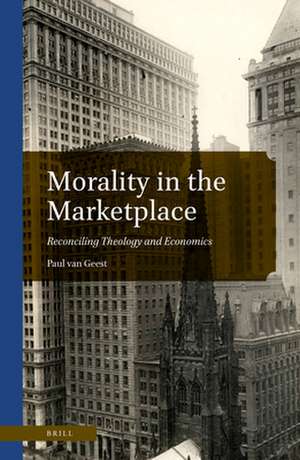Morality in the Marketplace: Reconciling Theology and Economics
Autor Paul van Geesten Limba Engleză Paperback – 24 noi 2021
Yet, as the Covid crisis has recently shown, if economic development is to really stand a chance of success, it should go hand in hand with relational values like honesty, reliability and empathy: this will contribute to a society with a culture of reciprocity, respect, love and trust. In this essay, Paul van Geest pleads for a renewal of the old ties between economics and theology as scientific disciplines, so as to arrive at a deeper and richer anthropological fundament for economic research.
Preț: 306.93 lei
Nou
Puncte Express: 460
Preț estimativ în valută:
58.74€ • 61.16$ • 49.64£
58.74€ • 61.16$ • 49.64£
Carte indisponibilă temporar
Doresc să fiu notificat când acest titlu va fi disponibil:
Se trimite...
Preluare comenzi: 021 569.72.76
Specificații
ISBN-13: 9789004501744
ISBN-10: 9004501746
Dimensiuni: 155 x 235 mm
Greutate: 0 kg
Editura: Brill
Colecția Brill
ISBN-10: 9004501746
Dimensiuni: 155 x 235 mm
Greutate: 0 kg
Editura: Brill
Colecția Brill
Cuprins
1 Introduction
2 The Relationship between Economics and Theology as Scientific Disciplines through the Ages
1How God Appeared in the Economy (and Economics) of Antiquity, Judaism and Early Christianity
1.1Excursus: An Attempt at Economic Exegesis
2Market and Morality in the Works of Church Fathers
3Economics as a Component of Theology in Scholasticism
4Market, Morality and Anthropology during the Reformation and Counter Reformation
5How God Disappeared from the Economy
3 Theology as a Coldshouldered Participant in Economic Discussion
1Preamble: Religion and Economy or Theology and Economy?
2The Course of History as a Prelude to the Disqualification of Theology
3The Irrelevance of Theological Sources
4The Epistemological Assumptions of Economic and Theological Research
5Developments in Theology
4 Towards a Mutual Rapprochement between Economics and Theology: A First Sketch
1Introduction: Theological Economics or Economic Theology?
2Criticism of the homo economicus, a Prelude to Interdisciplinarity
3The Drive for Insight into Motives as a Second Prelude
4The Complementarity of the Economic and Theological Views on Nature and Exhaustibility
5 The Indispensability of Theology for Enriching Economic Concepts
1Introduction
2The Economy and Community Building. Luigino Bruni on Gratuity and Augustine’s Doctrine of Grace
3The Economy, Probabilities and Uncertainty. Bart Nooteboom on Trust and the Theological Notion of pistis
4The homo economicus as a Threat to Social Cohesion. Samuel Bowles on ‘Outcrowding’ of Morally Responsible Behavior and Augustine on timor servilis and amor castus
5Taking Stock
6 Economic Notions Seen in the Light of the History of Theology
1Introduction
2Negative and Affective Theology as a Prelude to a Deeper Insight into Bounded Rationality
3Theological Anthropology as a Source of Insight into Bounded Morality
4Bounded Willpower Explained in the Light of the Theology of Grace
5Bonus: The Relationship between Happiness as an Economic Variable and Temperance as a ‘Theological’ Virtue
Epilogue
1Market, Model, Morality and Anthropology
2Language and Reflection on Economic Processes
3Conclusion: Keynes’s Take on the Economist and the Theologian
Bibliography
Primary Sources
Secondary Sources
Index
2 The Relationship between Economics and Theology as Scientific Disciplines through the Ages
1How God Appeared in the Economy (and Economics) of Antiquity, Judaism and Early Christianity
1.1Excursus: An Attempt at Economic Exegesis
2Market and Morality in the Works of Church Fathers
3Economics as a Component of Theology in Scholasticism
4Market, Morality and Anthropology during the Reformation and Counter Reformation
5How God Disappeared from the Economy
3 Theology as a Coldshouldered Participant in Economic Discussion
1Preamble: Religion and Economy or Theology and Economy?
2The Course of History as a Prelude to the Disqualification of Theology
3The Irrelevance of Theological Sources
4The Epistemological Assumptions of Economic and Theological Research
5Developments in Theology
4 Towards a Mutual Rapprochement between Economics and Theology: A First Sketch
1Introduction: Theological Economics or Economic Theology?
2Criticism of the homo economicus, a Prelude to Interdisciplinarity
3The Drive for Insight into Motives as a Second Prelude
4The Complementarity of the Economic and Theological Views on Nature and Exhaustibility
5 The Indispensability of Theology for Enriching Economic Concepts
1Introduction
2The Economy and Community Building. Luigino Bruni on Gratuity and Augustine’s Doctrine of Grace
3The Economy, Probabilities and Uncertainty. Bart Nooteboom on Trust and the Theological Notion of pistis
4The homo economicus as a Threat to Social Cohesion. Samuel Bowles on ‘Outcrowding’ of Morally Responsible Behavior and Augustine on timor servilis and amor castus
5Taking Stock
6 Economic Notions Seen in the Light of the History of Theology
1Introduction
2Negative and Affective Theology as a Prelude to a Deeper Insight into Bounded Rationality
3Theological Anthropology as a Source of Insight into Bounded Morality
4Bounded Willpower Explained in the Light of the Theology of Grace
5Bonus: The Relationship between Happiness as an Economic Variable and Temperance as a ‘Theological’ Virtue
Epilogue
1Market, Model, Morality and Anthropology
2Language and Reflection on Economic Processes
3Conclusion: Keynes’s Take on the Economist and the Theologian
Bibliography
Primary Sources
Secondary Sources
Index
Notă biografică
Paul van Geest, Ph.D, is Professor of Economics and Theology at Erasmus University Rotterdam, Professor of Church History and History of Theology at Tilburg University and Visiting Professor at the Faculty of Theology and Religious Studies at KU Leuven
